How Failure built ambitious new album Wild Type Droid from 36 hours of jam session recordings
Ken Andrews and Greg Edwards share the gear and tone secrets behind the influential alt-rock outfit's latest full-length, which finds them indulging their love of baritones, Axe-Fx and even Gibson Explorers
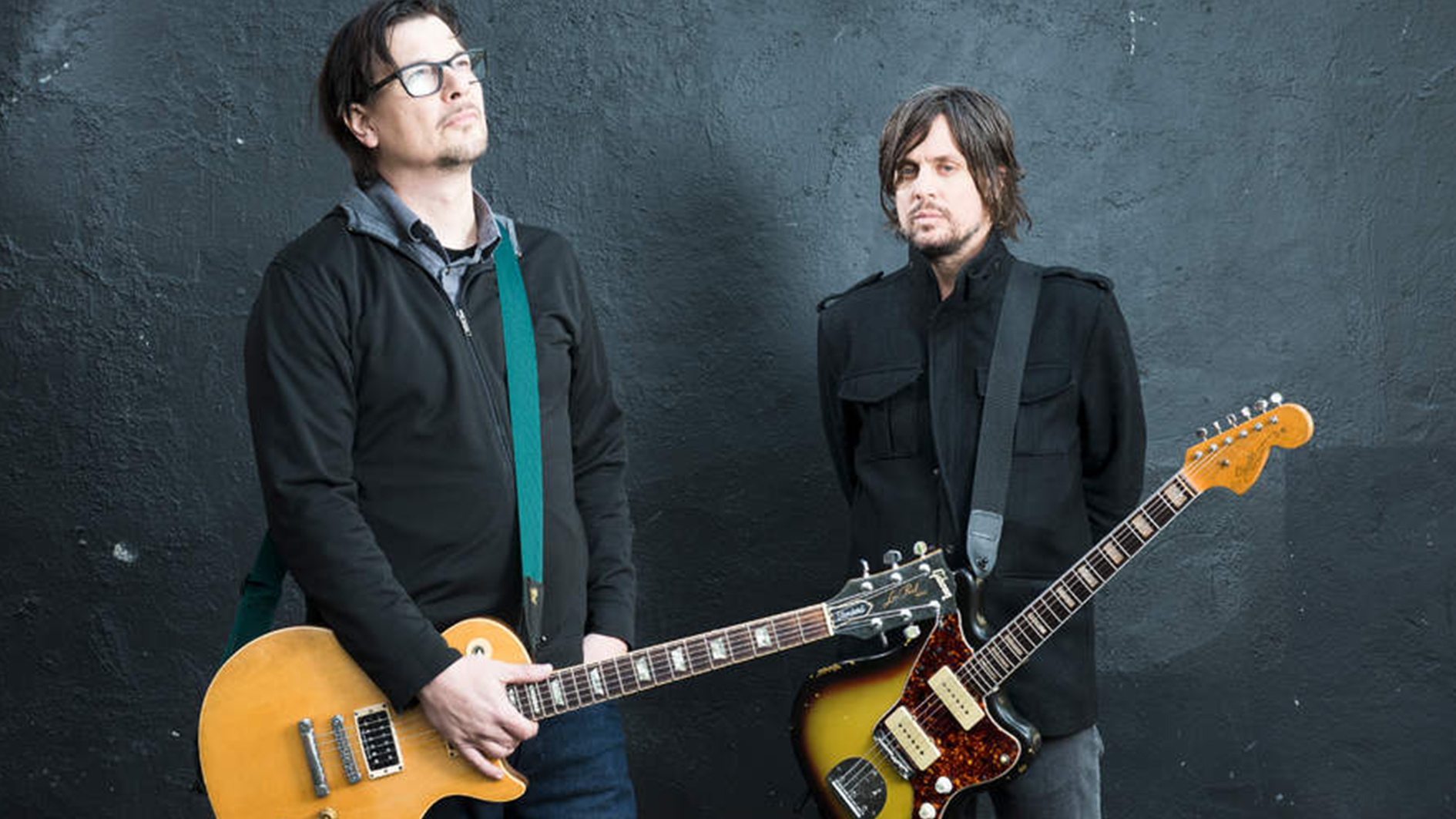
Failure's 1992 debut Comfort gave little indication of what the band would become. It was a snotty, visceral record, with only passing nods to the expansive sound design they would become known for. Despite the fact that it holds up well even today, the band's songwriters, Ken Andrews and Greg Edwards, felt it had missed the mark.
On 1994's Magnified, Andrews and Edwards took over production duties, and expanded their sound, switching instruments depending on the song. From an early 'grunge' tag, people started to note their increasingly experimental sonics, and adjusted their expectations.
By the time of 1996's Fantastic Planet, they were often described as 'space rock'. Their proto-grunge had morphed into minimalistic arrangements characterized by thundering bass and angular guitars. Though they disbanded in 1997 after touring the record, it was an influential album, soon regarded as a cult classic.
Failure reformed in 2013, hitting the road with their friends in Tool. They'd been keeping busy in the intervening years – Andrews worked on various musical projects when not plying his trade as a producer, while Edwards founded Autolux.
In 2015 they put out The Heart Is A Monster, a continuation of the threads begun on Fantastic Planet 20 years before. During 2018, they released a series of four EPs that combined into their fifth album, In the Future Your Body Will Be the Furthest Thing from Your Mind.
Now they're back with a new album, Wild Type Droid, having hinted at working on music for the past year. Wild Type Droid was written during the pandemic, making heavy use of improvisation in the writing process.
Guitar World picked up the phone to Andrews and Edwards for an expansive conversation about the new album, their songwriting and producing, and what continues to motivate them to make music together.
Get The Pick Newsletter
All the latest guitar news, interviews, lessons, reviews, deals and more, direct to your inbox!
The word is that a lot of the new record was improvised. Is that true?
Edwards: “We just went into a big room, set up for three weeks, and recorded every day whatever we came in and [did]. That allows there to be a lot of freedom to show up, put an instrument on and let it make noise.
“I think that's why there's a cool minimalism on this record in the arrangements. There's a lot of points where there's space for each thing, so you can appreciate the bass because the guitar is just punctuating the high-end more.”
That's interesting. Because it's not so calculated?
Edwards: “There's a certain focus and anxiety when you're just composing in front of two speakers, like if we're sitting in a room together, or one of us is alone just trying to write something, it's not as free.
“What we did when we went in and just improvised as a three-piece is we just let what happened, happen. We just showed up. In a lot of cases, it might feel like for a whole day nothing good was happening – we just made a bunch of noise. But when we sat back and listened, there would be all these little happy accidents and wonderful little moments that we could expand on.”
How could you even make a record during this time and not have the things going on seep into whatever art you're making?
Ken Andrews
Andrews: “That's exactly how we made it. We formalized this two-phase [way] of making an album. The improv stage, where we're just coming up with the raw building blocks of what will eventually become songs, and there's the editorial and arranging phase where we're making the raw material into songs.”
Ken, in your recent solo material, you tackled overtly political topics for the first time. Did any of this carry over to what you and Greg drew on for Wild Type Droid?
Andrews: “I think that a lot of the things going on in the country in terms of the pandemic, and the political division, and the political breakdown that's occurring here are in both my solo thing and the new Failure record.
“I think, y'know, maybe on the new Failure record it's a bit less obvious and a bit more poetic, but I think they're there. How could you even make a record during this time and not have the things going on seep into whatever art you're making? It's pretty dramatic.”
Edwards: “I would agree with that. My tendency is always to steer as far as possible away from anything that's topical or on the surface of the culture, at any given moment, when I'm working on lyrics.
“I just think that at this particular time, and maybe on the last record, too, what was happening in the world politically wasn't just the surface. It was so deep and divisive and destabilizing whoever you are, that it found its way into the themes of the record.”
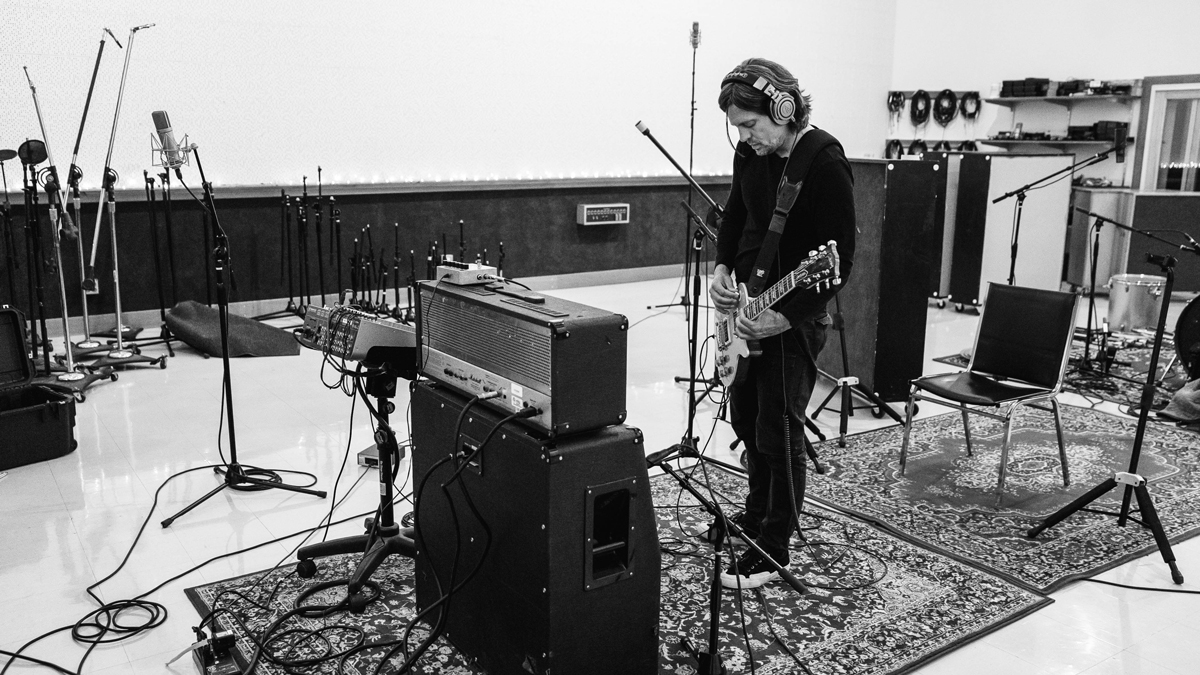
Though it's still not exactly spelled out, like any theme you guys have written about.
Andrews: “Failure has its own way of dealing with things in a slightly more opaque way.”
Edwards: “The way we made this, the emotions we were feeling and the moods we wanted to evoke came out.”
Besides themes, how do you see the mood of the album within Failure's discography? It feels like your saddest record. There's a deep melancholy to a lot of the material.
Andrews: “I think all along that way, the way we work as artists is that we tell each other what's resonating. 'I don't know why, but what you just played really moves me, and I want to explore that.'
“So when you listen to the record and your takeaway is that it's a darker or sadder record, well, I think that's just what was resonating for us as people when we were evaluating our own work. Rather than an explicit effort to make a dark record. That was never discussed.”
Edwards: “Ironically, just the opposite was discussed. But once we got in there, and you're playing five or six hours a day, in spite of yourself you're going to end up spending the time on the moods and the improvs that are evoking the emotions that you're resonating with.”
When you make something like that, 36 hours of improv, it took me from September to January, or to Christmas 2020, to whittle it down to three hours
Ken Andrews
Andrews: “I think that's a direct reflection of how we're feeling as people. Just the raw emotion. The disappointment and the – all the emotions that everyone is going through, the anger, the frustration and the feeling of helplessness.”
Edwards: “The fight or flight response in the human species is there to protect us. When it's a wild animal, it's very simple: you're either fighting or you're running. But I just think it's really kind of depressing and inspires a lot of hopelessness that when the risk comes from something so ethereal and out of our control as a novel virus, we can't just simply fight or flee, and it seems what we do in that situation... is we go after each other, and that's horrifying in this situation.
“There's far worse things than Covid that can befall humans, and it doesn't give me a lot of confidence that the way we deal with existential crisis like this is to eat each other.”
So in terms of arranging the material you had recorded, how big a task was that?
Andrews: “There's 36 hours of music, where I've edited out all the dead air, or people going to the bathroom and everything. [Emphatically] 36 hours of playing.”
Edwards: “And we got that down to, like, three hours of greatest hits.”
How?
Andrews: “Here's the thing: when you make something like that, 36 hours of improv, it took me from September to January, or to Christmas 2020, to whittle it down to three hours.
“So basically it was like a ginormous filtration process where we took this massive file essentially, and whittling it down until it became a highlight tape, of what we felt were some great moments that could become songs.”
What did the arrangement and songwriting process look like from that point?
Andrews: “Once we had that highlight version, Greg and I started meeting here at my studio in the beginning of 2021, and getting down to the work of picking an actual idea and trying to spin that into a full song.
“Sometimes those ideas were pretty well developed, like there would be a three-, four-, five-, maybe even 10-minute jam of a particular idea and we could really pore over that, and kind of cut it down to y'know, half that length or something.
“Other times, we were pulling from four bars, or even less, where something kind of magical happened, and we both cued in on it and went, 'This is really cool, but it's not a song – it's a moment.'
“It's a guitar moment over a bass moment over a drum moment that's interesting and cool, and it's something that you would never come up with on your own, if you were sitting down with an acoustic guitar and trying to write a song.”
There's bound to be more serendipity when you're all playing in a room.
Andrews: “You can't recreate that. You've got three brains reacting to each other in real time. You're purposefully trying, as a person and an artist, or at least I was, to not overthink it.”
So how much material came from the jams and improvs versus structured writing, in the end?
Edwards: “I would say maybe 60 percent of the music on the record, or maybe a little more, is all sourced from the jams.”
Andrews: “Sourced from the jams compositionally, or writing-wise, or melodically, but also the actual recordings from the jams are all over the record. Personally, my current favorite songs, like Headstand, all the drums, all the guitar, are both exclusively from the August 2020 jam sessions.”
Ken, you've mentioned on your YouTube channel how the Chase Bliss Audio MOOD was all over the new album. Apart from that, was the recording rig any different to your touring rig?
Andrews: “They're the same. Since we've rebooted, we're a Fractal Axe-Fx group. When we did reboot and do that first tour, the Tree of Stars tour, where we were playing stuff from the '90s, from all three records, the idea of putting an analog rig together to pull off those three records live just seemed really unrealistic.
I literally got texts from two guitar players who are just hearing the record today, and they're like, 'No way is this whole record Axe-Fx,' and I'm like, 'Well, yeah it is'
Ken Andrews
“I still had a lot of bad memories of those big analog rigs we used in the '90s, in terms of breaking down and not being reliable. The whole Axe-Fx thing ticked a lot of boxes for us, and for me in particular. I don't feel limited by that box at all. I literally got texts from two guitar players who are just hearing the record today, and they're like, 'No way is this whole record Axe-Fx,' and I'm like, 'Well, yeah it is.'”
Edwards: “It's not necessarily out of the box going to sound the way it does on our records, but if you have Ken dealing with the sound, then it's incredible to have the continuity from the jam, demo phase, straight through to the writing, recording, finalizing of an album, and then straight through to the live shows. It's kind of amazing.”
So how did you make it sound so real? Is it all the Axe-Fx or is it something else in the production as well?
Andrews: “One of my favorite reverb plugins is the IK Multimedia Sunset Sound. I mean, Jesus, it's the ambience of all three of those studios – studios both Greg and I have worked in for real – in a plugin. It's one of those things where you can really make it feel like there's an amp in a room, or this is a guy singing in an actual room.
“One of the reasons I love that particular plugin is I don't feel like [they went] in there and fixed all the resonances to make it smooth. I mean, they're IRs, right, impulse responses, and they kept them raw, just like the actual rooms really are.
“It has more realism in it, and it has more anomalies, on certain notes. Certain notes jump out, because they're resonating with the room. That plugin is all over the record...
“My favorite thing about that plugin is the rooms, the short ambiences. Because the studios at Sunset Sound are not big live rooms – in fact, they have some of the lowest ceilings I've ever seen in a recording studio.”
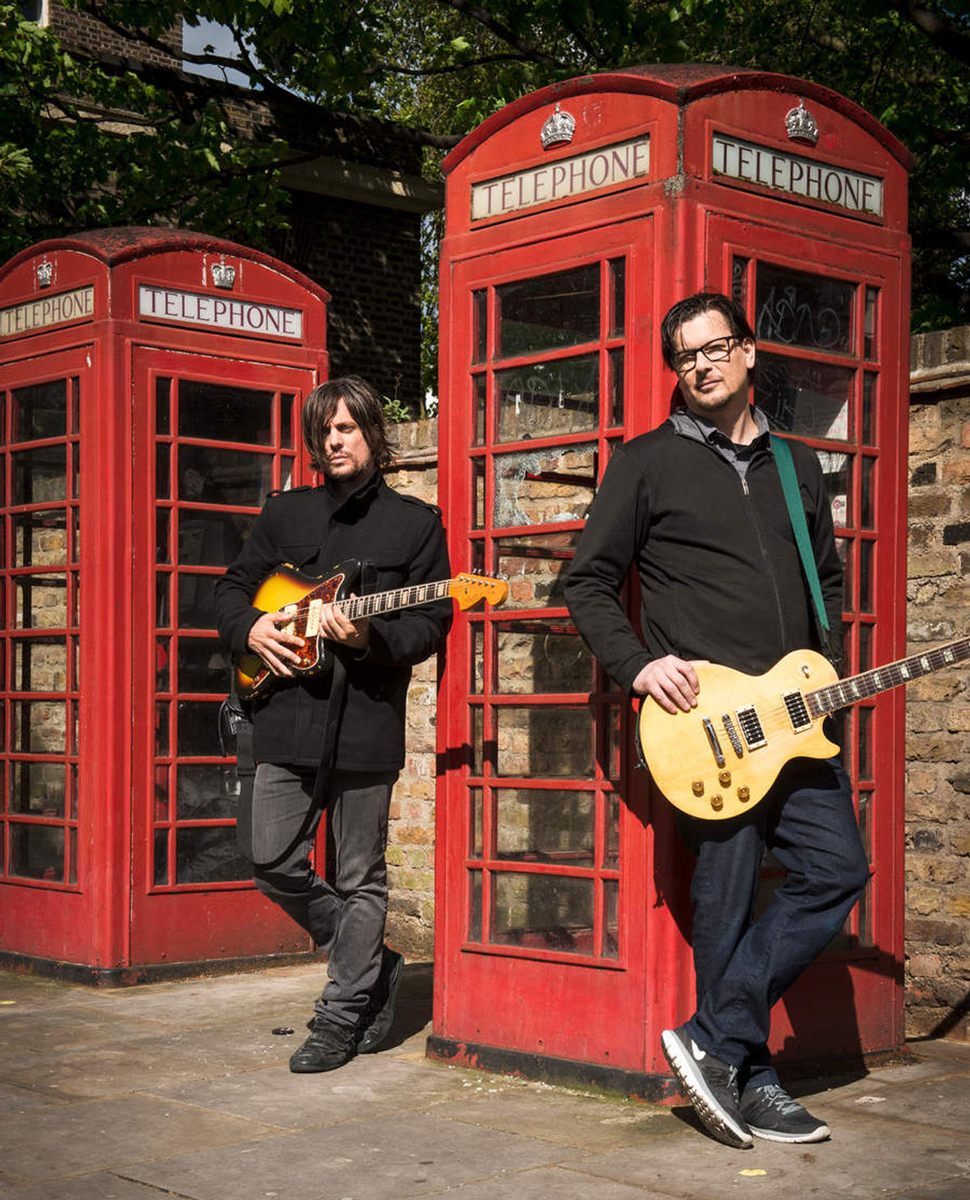
Edwards: “In One and Three.”
Andrews: “One and Three are like, 10-foot ceilings, which is really low for a recording studio. But y'know, One is like, Van Halen I and II, drums in that room, and the guitar as well, so there's probably some of that subconsciously as well. The Fractal has some great room ambiences, but they seem a little more manicured to me, and a little more perfect. That's why I like the Sunset Sound.”
So did you play live sound out from a cab while jamming? There's audible feedback in places on the record.
Andrews: “You did hit on one interesting thing, that we didn't get a lot of, if any, and maybe that's the Axe-Fx's achilles heel, and the whole idea of going direct, which is lack of feedback. Or lack of guitar-cabinet, in-the-room interaction.”
Edwards: “Even before feedback, it's just resonating the strings at a certain volume, and that does something. Short of feedback, there's a loop going on that adds to sustain and changes the tone.”
Andrews: “There's a couple ways around that. First is that you pipe the sound into some form, of a speaker. And we do that here in my studio when we want feedback. We pull up a Fractal sound that has distortion, and we turn up my speakers really loud. It gets feedback, just like an amp would.
The Les Paul to me is just such a beautiful, perfect instrument. It does so many things so well, and I always liked the weight. I always liked the heft – it's comforting. Not for my back, though!
Greg Edwards
“However, I would say there's one interesting exception on the record, which is the last song, Half Moon. That's the only song on the record that has real guitar amp on it, and that was because we were finishing up the drums as an overdub at Dave Grohl's studio in the Valley, Studio 606.
“We were doing the drums for the songs that we were going to redo from the jams. There were a few songs where we knew we were going to just keep the drums from the jams. We had about six songs we needed to cut, we cut those in a few days at that studio, and then on the last day, we were like, 'What about Half Moon? Are we going to put drums on it? What kind of drums?'
“We ended up getting creative in the studio and came up with a muffled, ambient drum sound, really using the live room, which is a huge room with an amazing ambience to it.
“Then we were like, 'Well hey, we've got this bridge and Greg wants to put some electric guitar on it. We're here, we still have a few hours left, why don't we just throw Greg in the live room?'
“Dave has, I don't know, 30 or 40 guitar amps that you can use when you're working there, so we just went into that warehouse off to the side, grabbed a Marshall and threw it in the live room, and Greg played all the electric guitar, including the feedback moments for Half Moon, at studio 606.”
Edwards: “I still love the fact that I don't think we've talked about an actual guitar yet.”
Sorry about that. Greg – Strat or Jazzmaster?
Edwards: “I keep wanting to spend some time on a Strat, but you know, I have no exposure to Strats, for whatever reason.”
It feels like your iconic look is as a Les Paul player. Especially live.
Edwards: “That's Ken's Les Paul, the same Les Paul that goes all the way back to Fantastic Planet. The Les Paul to me is just such a beautiful, perfect instrument. It does so many things so well, and I always liked the weight. I always liked the heft – it's comforting. Not for my back, though!”
I listened to a lot of Cure before and during the making of this record. I really immersed myself into it, and Robert Smith is just a god to me, basically
Ken Andrews
What year is it?
Andrews: “‘76, straight Les Paul Standard with the natural blonde wood color, and a rosewood [fingerboard]. The day I bought it, I spent two-and-a-half hours in the store... I think it was Voltage Guitars. During that time, '94 to '95, we had finished the touring for Magnified and we were about to go and make Fantastic Planet, and I wanted a Les Paul. I knew I wanted a '70s Les Paul, a player's guitar.
“Voltage, at that time, was all about that era of guitars, where they just had 50 or 60 '70s instruments in there. They had seven [Les Paul Standards], from '74 to '79, all strung up and ready to be taken back to their practice room and played with.
“Playing all seven of those, they were quite different to one another, and you know how it is with guitars: you pick one up, and it just either feels good, or it doesn't. That one, I just kept playing it through the little practice amp they had in the back room, and finally somebody came back and was like, 'Okay, are you done? There's somebody coming in for a lesson now so you're going to have to leave.'
“So that's the one I bought. I think I got it for $700.”
Edwards: “Wow.”
Andrews: “It was not their most expensive one. It was a Standard, and they had Customs that were 15, 16, 18 hundred dollars. I couldn't afford those. It's just one of those guitars: felt good in the store and we've used it on every record since.”
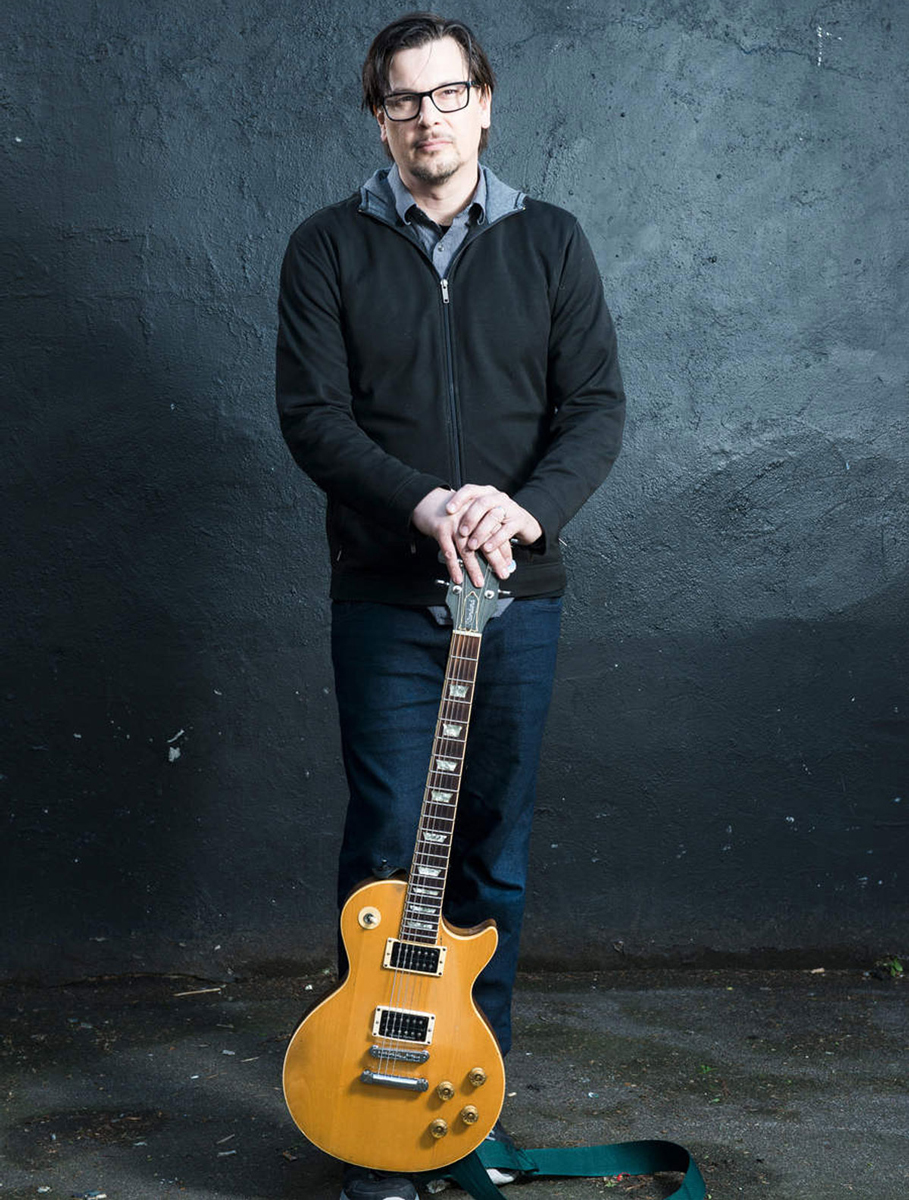
Did anything else make it onto the record? There was talk of a baritone and Bass VI.
Edwards: “Yeah, actually I wanted to ask Ken. When we went into this big room and started to jam, Ken just showed up with a Bass VI and a baritone guitar, a Danelectro baritone. I felt like I was playing that baritone and the Bass VI, we were both playing those – like I would be on baritone and he would be on Bass VI – a lot. Why did you bring those in? What was your thinking?”
Andrews: “I listened to a lot of Cure before and during the making of this record. I really immersed myself into it, and Robert Smith is just a god to me, basically. Especially when you look at his entire discography with The Cure. All the different production styles and guitar sounds that he's gotten over the years.”
Edwards: “He is the central bonding point, musically for us, through our whole career together, I would say.”
Andrews: “I agree with that. So, I was listening to that, and there's a ton of Bass VI on there. There wasn't a lot of baritone, but I started thinking, 'Hey, let's push ourselves out of our comfort zones a little...' just not have the first thing we put on be the Failure Les Paul.”
Edwards: “What was amazing for me was that I've spent almost no time on either of those instruments. Whenever there's something different or weird, I just pick it up, and the baritone – I was just in love with the sound of that as we were playing. That was a really great, inspirational way to start all the jamming. We ended up getting so much of the signature sound and parts from the sounds of those instruments.”
We ended up pulling the most musical ideas when Greg was on the baritone. So the baritone is now part of our arsenal of instruments
Ken Andrews
Andrews: “Especially the baritone. The baritone is all over this record. Half the record is baritone for sure, maybe more. [There's] Bass VI on three of the songs. So yes, we were switching off who was playing Bass VI and who was playing baritone, and sometimes somebody was playing Bass VI and sometimes somebody was on regular bass, but we tried all different combinations.
“The one that I think we ended up pulling the most musical ideas out of was when Greg was on the baritone. So the baritone is now part of our arsenal of instruments. Because of that, and no knock on Danelectro, but this Danelectro, I bought it 10 or 12 years ago, I think I got it for 200 bucks.
“It has a cool sound, but it's not a very reliable instrument. It's neck-heavy and it squeals really bad when you have your sound in the PA or a monitor, or a cabinet, whatever.
“It's fine for recording, and we had it intonated so it worked pretty good, and it has that characteristic baritone sustain on those long open notes that are everywhere on the record.
“In fact, I was just going to tell Greg that yesterday it arrived – we actually just bought a new baritone, specifically because we used the baritone so much on the record and need to play those songs live. So we got this Reverend [Descent] guitar.
“They make a really interesting baritone that I'm looking at right now, and the reason it's interesting is that it sounds like the Danelectro in terms of the strings on the frets tonality, but the neck is the length of a regular guitar, and I'm not exactly sure how they did that... it's so much easier to play.”
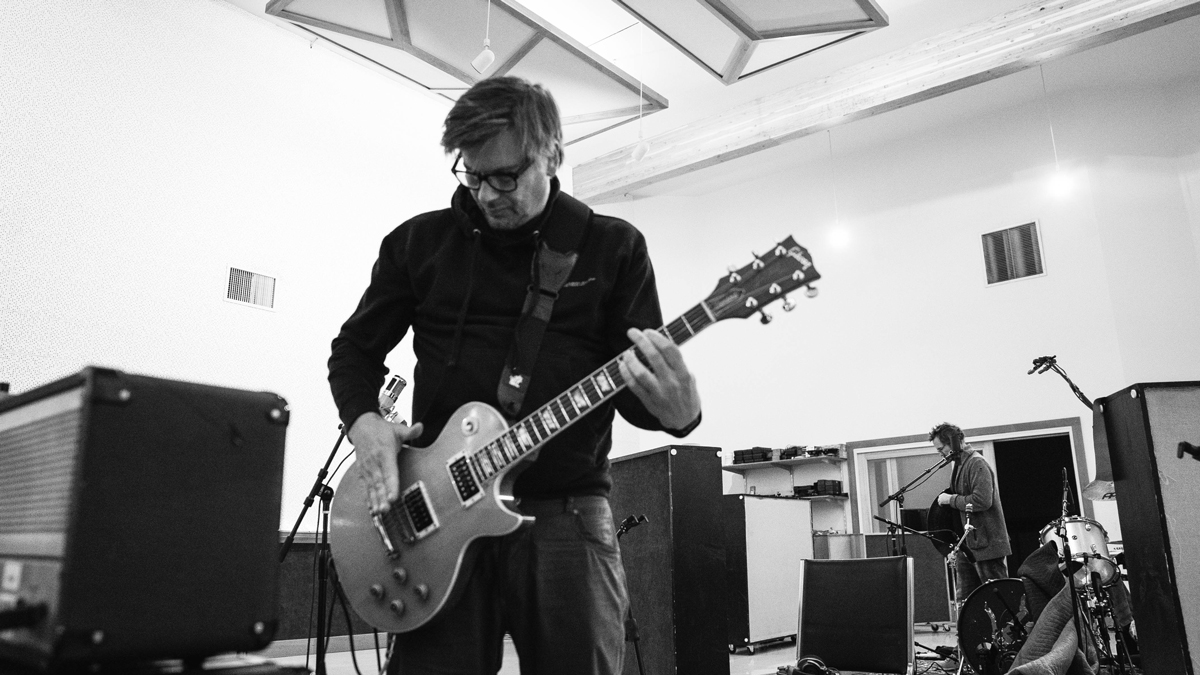
Did you use any other guitars on the album?
Andrews: “There's tons of the Les Paul, there's a lot of the '67 Jazzmaster that we've had for a while. The other new guitar that I brought into the jams, besides the baritone and the Bass VI, was a Gibson Explorer.
“That also makes quite a few appearances on the record. The pickups in it, you know, I don't know what they're called, but it's a 'humbucker guitar' for sure, but somehow there's a chime-iness to it when you play chords, especially high chords. That really fits our style, where we're playing chord forms up on the neck.
“On some guitars, one note will kind of dominate the others too much, but with this Explorer those chords really shine. Almost to the point where you don't hear the individual notes in the same way you do on other instruments, and you really hear the chord all at once, if that makes any sense.”
Andrews: “It's kind of like an SG. I always think of an SG as doing that. It's just a really tight ball, all the notes are just glued together.”
What year is that?
Andrews: “It's brand new. I got it free from Gibson, because I did an interview for them.”
Art, like music, is a map, and the territory is the whole mysterious world of our experience as humans
Greg Edwards
Nice. Was that your choice? It doesn't immediately scream ‘Failure’.
Andrews: “No, they weren't going to give me anything, and I had to beg for it... I basically begged for, like, two weeks, but I love it and I think it plays great. I'm going to be playing it, and I think Greg will, too.”
What's your philosophy toward the guitar as an instrument? Is it something magical, or just a tool in the toolbox?
Andrews: “To me, I look at it as a tool. I do fetishize over guitars, like I do over lots of different equipment... but I don't think we have any overly emotional feelings about the instruments.”
Edwards: “My approach to the guitar is, I'm a bass player originally. That's the instrument that I'm comfortable on and that I'm pretty technically proficient at. The guitar is the instrument that, even though I'm better now, after all these years, I still feel like I don't know what I'm doing when I pick it up.
“I always feel like I have no foundation or repertoire, and that's exactly what I love about it. It's just a discovery tool, and I have no idea what I'm gonna do: I'm just waiting for something to happen, finding a crazy shape and seeing how it works.”
- Failure's new album Wild Type Droid is out now.
Alex Lynham is a gear obsessive who's been collecting and building modern and vintage equipment since he got his first Saturday job. Besides reviewing countless pedals for Total Guitar, he's written guides on how to build your first pedal, how to build a tube amp from a kit, and briefly went viral when he released a glitch delay pedal, the Atom Smasher.
“The rest of the world didn't know that the world's greatest guitarist was playing a weekend gig at this place in Chelmsford”: The Aristocrats' Bryan Beller recalls the moment he met Guthrie Govan and formed a new kind of supergroup
Carlos Santana hospitalized following pre-show medical emergency




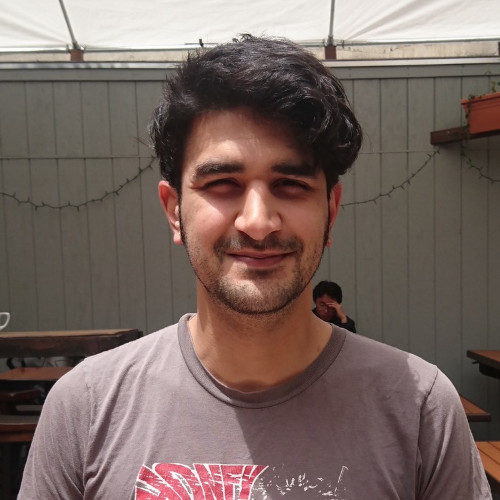


![[from left] George Harrison with his Gretsch Country Gentleman, Norman Harris of Norman's Rare Guitars holds a gold-top Les Paul, John Fogerty with his legendary 1969 Rickenbacker](https://cdn.mos.cms.futurecdn.net/TuH3nuhn9etqjdn5sy4ntW.jpg)







